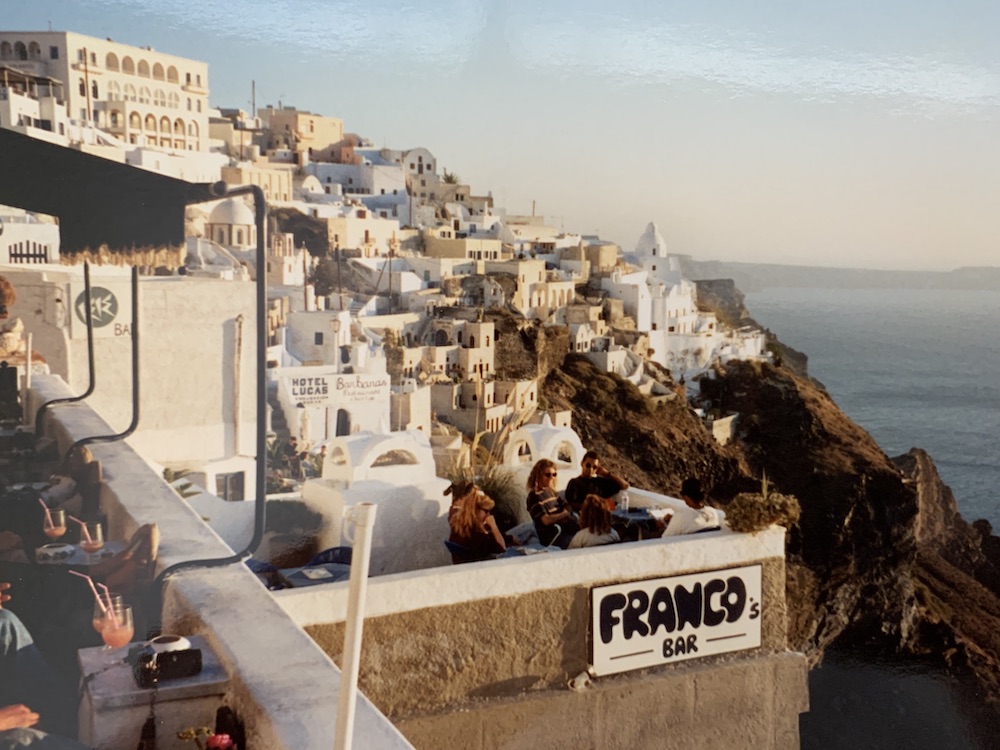How Memory Becomes Fiction
In the twenty-five-plus years since the journey that took me around the world and about which I am now writing a memoir, I have taken shards of memory of that time and transplanted them into countless stories and poems. Bits and pieces of memories have found their way into notebooks and writing practice sessions too numerous to count. Bones of memory have had added onto them what didn’t happen but might have. Characters who were never part of the actual journey appear as if they were part of the scene.
 For example, over the years, I’ve written and rewritten the story of a woman of a certain age, traveling alone, and her interactions with a younger man during a few days and nights on the Greek island of Santorini. Titled, “On Thira Without Reservation,” the story has been submitted and rejected more than a few times and was rewritten once more just a few years before I started the memoir. Consequently, the memory of the fictionalized story was more recent than any real memories of my time on Santorini.
For example, over the years, I’ve written and rewritten the story of a woman of a certain age, traveling alone, and her interactions with a younger man during a few days and nights on the Greek island of Santorini. Titled, “On Thira Without Reservation,” the story has been submitted and rejected more than a few times and was rewritten once more just a few years before I started the memoir. Consequently, the memory of the fictionalized story was more recent than any real memories of my time on Santorini.
Writing Memoir from Memory
As an exploration, in the first hand-written draft of the memoir, I relied on memory alone, without consulting the journals I kept at the time. I’d long wanted to write the memoir, and I was also curious how memory would function in relation to creative work developed from a particular time, and what it would offer up. Consequently, I never knew as I entered into any room in the memory palace I’d constructed of that journey, whether I would emerge with a story truer to a fiction I’d written or to my actual experience.
Then, somewhere around mid-point in an early draft of the memoir, I found I couldn’t rely on just memory to tell the story I wanted to tell. The work was beginning to feel wobbly and unable to hold itself up. I needed chronology, descriptions of places and people, details of who, what, when, where, and emotional responses to experiences that I’d written as I experienced them. Time had come, I decided, to dig out the old journals and photographs I’d kept stored away and consult them.
What a laugh then, when I reviewed my journals, to discover what really happened on that romantic Greek island all those years ago. Yes, there was a young man, and yes, I was a woman of a certain age. Recorded in my journal were many coincidences of seeing the young man, first on the ferry from Mykonos to Santorini, then at the breakfast service at the pension where, apparently, we were both staying, once at a café, another time at the beach, and once again walking nearly step-by-step on the same street—but beyond that, everything was fantasy, a titillating little morsel made up from memory and imagination. In fact, according to my journal, the young man and I had never even spoken.
Shaping Memory into Memoir
I’m further along in the memoir now, draft 3.5, as I call it, though who can really count the number of times I have revised, rewritten, restructured the thing. I’m back on Santorini with my coffee and my journal in October 1990, watching the sunset from a table on the patio of Franco’s Bar. The story is different now. I’m using details from those old journals, choosing what to include and what to leave out and adding just enough imagination to shape memory into memoir. It’s not nearly as much fun as the fictional story, but it tells a truer truth.


I’m so glad I read this, Judy. When I wrestle with whether what I just wrote is true, I’m going to stop and think, “Is it a truer truth?”. Yes, I need “chronology, descriptions of places and people, details of who, what, when, where, and emotional responses to experiences”.
I was struggling with a story about returning to a place from my childhood. “Was I seven or eight? How many times was I there? When, no really, EXACTLY when was I last there?” Then I thought, “Who wants to know?”. Once I figured that out, I could get back to writing about the “truer truth”, which is really what’s important, no?
Be well, my friend!
Hi John,
How good to hear from you. I hear you about the struggle of the EXACT factual info, but really… Looks like we’re on the same page regarding, does it really matter whether it was Tuesday the 9th or Wednesday, another 9th? (I even printed out a whole calendar for 1990 so I could have the dates right. A way to keep me from going for that deeper, truer stuff.
Hope all goes well and safely for you, too.
Thanks for stopping by,
Judy
Again, many thanks for your post Judy.
I was on the island of Santorini last year and vividly recall sitting on the veranda of a mountainside café precariously overlooking the Aegean Sea. Sitting leisurely, drinking my coffee in the voluptuous Greek sunshine and gazing down, in the wonder of it all….
So much to do in just one life, and so much more to see….
Stay safe
Ah, yes, Michael, sigh. I was there again two years ago. But would I go again. Oh, hell yes.
Thanks for stopping by, as always, I appreciate our small connections via our blog posts.
best,
Judy
Judy
Wonderful story about how your memoir devolved and evolved. I too am on draft 3.5 as you call it, but during this pandemic I find that I have had a chance to put in some solid hours at the keyboard. I have finished about 12 chapters out of 16 and I am enjoying the journey. Thanks for your inspiration.
Bill
Hey Bill,
So good to know you’re getting those solid hours in and look how far into the journey you are. And still enjoying it. That makes all the difference. Congratulations. Let’s just keep doing this.
Thank you so much Judy this was extremely helpful.
Thank you, Geri. It’s nice for you to write. I appreciate you comment and glad that the post was helpful.
Santorini is one of the most romantic places in the world. I’m not surprised you’ve written about a woman’s tryst there. Fun that you found the young man in your journals. Perhaps the interludes in your short story really happened to you in a past life. I’d love to read it!
I’m so happy you continue to work on your memoir. I can’t wait to read it either.
Perhaps in a past life, Jill. Thanks for your thoughts. I’ll send that story to you sometime. Meantime, lets both just keep wriitng.
xoxo
So anxious to hear your first version 💕
Maybe I’ll share it with you and you can offer some comments that might make it submittable somewhere.
Thanks Marilyn.
Judy,
Thanks for this post.
I enjoyed reading it and it seems I can picture you sitting on the patio and having coffee. I’ve missed seeing your posts, so this is a welcome one. I am finding some of my former writings and am pleasantly surprised by what I’m now reading….not too awful! I am gong through myriads of papers, books and photos, trying to clear out clutter.
Oh, Arlene, I love that you can imagine me on that patio with my coffee and my journal. Good news to read that you’re finding some writing you’d forgotten about … and that you like it! Wonderful.
And yes, I apologize for not posting more often. Everything’s a little crazy these days. You’d think, with all this time at home, I’d post more often. I’m certainly filling my current journals with pages and pages. I’ll try to do better.
Today, I can totally relate to your words “I found I couldn’t rely on just memory to tell the story I wanted to tell.” Searching through a box of stored papers, I found a folder of cards that I’d saved. I had no memory of these and when I read what the great love of my love had written, I wept with joy and sorrow. So, I think refreshing your memory with some concrete details from your journals will make your memoir more alive. I enjoyed what you wrote and it was meaningful that I read it today. Thank you.
Thanks for writing, MaryAnn. I know what you mean about finding what we forgot we’d put away and then being ambushed by all manner of emotion when we rediscover it. This happens when I read those old journals, too.
Thank you for your response Judy. “Being ambushed by all manner of emotion” is an absolutely perfect way to describe finding forgotten memories. A memorable phrase, I won’t soon forget.
Thanks again MaryAnn. Good to know we’re all in this together.
Hi Judy,
I just read in an e-book by Debby Stroud that the left brain tells us to observe a memory of what we are looking at even though the realtime object is right in front of us. We see the memory.
Interesting also is an article I read wherein it states that the brain cannot distinguish the difference in space/time between a thing that happened years ago and a thing that occurred this morning. They both feel the same.
However.
Memory is as you note in one of your awesome books, faulty. Even the good ones. It’s coquettish too and disappears when you most want it to stay. I wrote an entire family memoir without research or journal, not even Skippy, the name of the neighbour’s fox terrier when I was a young kid. Until I came to the one thing I could NOT recall: the name of the river that flows alongside the town. My almost nonagenarian aunt remembered but then she remembers everything. Scary.
Now I am on a different kind of memoir. This one makes me think which is probably good for my brain or something. It did not help when I got mad and deleted it and the only disk copies were not as complete.
I hope my left brain feeds me the facts and not just what it thinks those facts should be. Aunty can’t help me out with this one.
Take care,
Linda
Hi Linda,
In her book, I Could Tell You Stories, Patricia Hampl has an essay “Memory and Imagination,” which addresses this beautifully, too. My first idea for the memoir was that it would be a sort of hybrid memoir, writing the memoir/memory itself and then including more factual stuff about memory. But turns out I didn’t want to do all that research, and the story itself wanted center stage. Ain’t that just like a story.
These days, of course, I’m losing the names of rivers, flowers, birds, trees, friends, and what I had for dinner last night. (was it pizza? I think so).